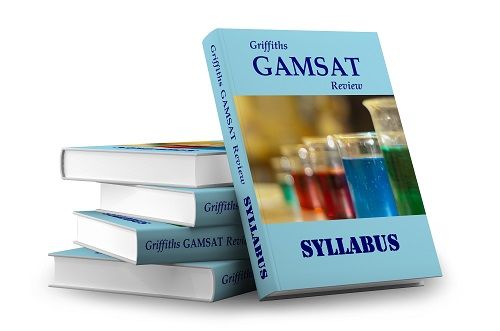GAMSAT Syllabus
This is my suggested GAMSAT syllabus for biology, chemistry and physics based on the topics most likely to come up in the actual test based on analysis of past sittings.
To download this syllabus in PDF format CLICK HERE (Right click & open in new tab)

Biology
Biological molecules
carbohydrates, proteins, lipids, enzymes
Nucleic Acids
RNA, DNA, energy & ATP
Cells
structure, specialisation and organisation
prokaryotic cells and viruses
mitosis
cell cycle
Cell Membranes
osmosis, diffusion, active transport
Immune System
phagocytosis
T lymphocytes, B lymphocytes, anti-bodies, vaccination
Organsims & Exchange
gas exchange in single cells
gas exchange in fish
gas exchange in plants
gas exchange in lungs
enzymes and digestion
Mass Transport
haemoglobin, circulatory system, the heart, cardiac cycle
transport of water in the xylem and organic molecules in phloem
Genetics
genes, DNA, chromosomes, ribonucleic acid
protein synthesis
mutations
meiosis
natural selection, inheritance, probability and genetic crosses
dihybrid inheritance, co-dominance and multiple alleles, sex linkage
The chi squared test
population genetics, isolation and speciation
Energy Transfer
photosynthesis, light and dark reactions
aerobic and anaerobic respiration, glycolysis, Krebs cycle,
Nervous System & Muscles
neurones, action potential, speed of nerve impulse, synapses
stucture and contraction of muscle
Homeostasis
feedback mechanisms, hormones, blood sugar control
osmoregulation, nephrons
Physical Chemistry
Atomic Structure
particles, mass number, atomic number, isotopes, electrons
electron arrangements and ionisation
Mass
atomic and molecular masses, the mole, moles in solution, the Avogadro constant
the ideal gas equation, empirical and molecular formaulae
balanced equations and percentage yields
Bonds
ionic, covalent, metallic bonds
electronegativity, forces between molecules, shapes of molecules and ions
Energetics
exothermic and endothermic reactions
enthalpy, enthalpy changes of combustion, bond enthalpy,Hess's law
Kinetics
collision theory, Maxwell-Boltzmann distribution, catalysts
rate of chemical reactions, rate expression, order of reaction, the rate equation, Arrhenius equation, the rate determing step
Equilibria
equilibrium reactions, equilibrium constant Kc, equilibrium constant Kp, rate determing step, equilibrium calculations
Oxidation, Reduction and Redox Reactions
Thermodynamics
enthalpy change, Born-Haber cycles
Electrodes and Electrochemical Cells
electrochemical cells,
direction of redox reactions
Acids, Bases, Buffers
pH scale, weak acids and bases, acid-base titrations
indicators, buffer solutions
Organic Chemistry
Naming
naming organic compounds,optically active compunds
The Carbonyl Group
aldehydes, ketones and reactions of the carbonyl group
carboxylic acids and esters and their reactions, acylation
Arenes
physical properties, naming, reactions
Amines
synthesis, as bases, as nucleophiles
Polymers
condensation of polymers
Physics
Particles
the atom, stable and unstable nuclei, photons, particles, antiparticles
Quarks and Leptons
particle sorting, leptons, quarks and antiquarks, conservation rules
Quantum Phenomena
photoelectricity, electrons colliding with atoms, atom energy levels and spectra, wave particle duality
Waves
measuring waves and properties, stationary and progressive waves
Optics
refraction of light, total internal reflection, double slit interference,
diffraction
Mechanics
vectors and scalars, balanced forces, moments, stability, equilibrium,
speed, velocity, acceleration, free fall, motion graphs,
projectile motion, Newtons laws of motion, force and acceleration, F=ma, terminal speed,
Force and Momentum
momentum, impulse, conservation of momentum. elastic and inelastic collisions, explosions
Work, Energy and Power
work, energy, kinetic energy and potential energy, power
Materials
density, springs, deformation of solids, stress and strain
Electric Current
currents and charge, potential difference, resistance and resistivity
DC circuits, circuit rules, electromotive force and internal resistance.
Further Resources
For more help with GAMSAT please check out Griffiths GAMSAT Review Home Study System which takes you step by step through all three sections with advanced strategies for each.

